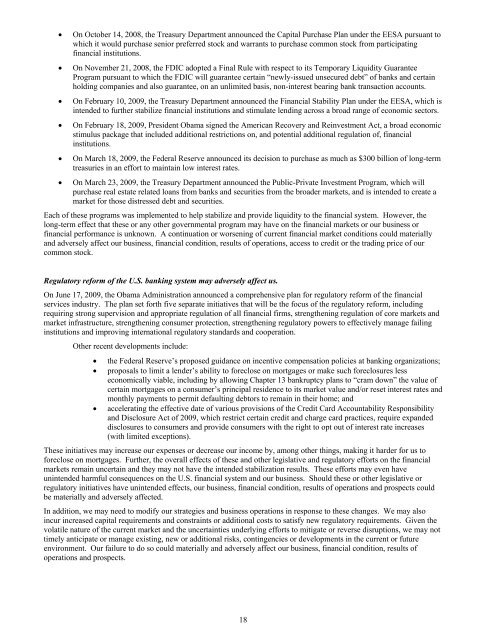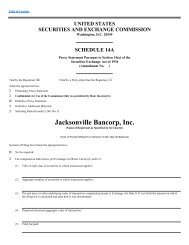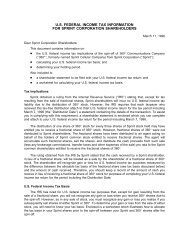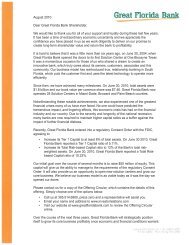pab bankshares, inc. - SNL Financial
pab bankshares, inc. - SNL Financial
pab bankshares, inc. - SNL Financial
You also want an ePaper? Increase the reach of your titles
YUMPU automatically turns print PDFs into web optimized ePapers that Google loves.
• On October 14, 2008, the Treasury Department announced the Capital Purchase Plan under the EESA pursuant to<br />
which it would purchase senior preferred stock and warrants to purchase common stock from participating<br />
financial institutions.<br />
• On November 21, 2008, the FDIC adopted a Final Rule with respect to its Temporary Liquidity Guarantee<br />
Program pursuant to which the FDIC will guarantee certain “newly-issued unsecured debt” of banks and certain<br />
holding companies and also guarantee, on an unlimited basis, non-interest bearing bank transaction accounts.<br />
• On February 10, 2009, the Treasury Department announced the <strong>Financial</strong> Stability Plan under the EESA, which is<br />
intended to further stabilize financial institutions and stimulate lending across a broad range of economic sectors.<br />
• On February 18, 2009, President Obama signed the American Recovery and Reinvestment Act, a broad economic<br />
stimulus package that <strong>inc</strong>luded additional restrictions on, and potential additional regulation of, financial<br />
institutions.<br />
• On March 18, 2009, the Federal Reserve announced its decision to purchase as much as $300 billion of long-term<br />
treasuries in an effort to maintain low interest rates.<br />
• On March 23, 2009, the Treasury Department announced the Public-Private Investment Program, which will<br />
purchase real estate related loans from banks and securities from the broader markets, and is intended to create a<br />
market for those distressed debt and securities.<br />
Each of these programs was implemented to help stabilize and provide liquidity to the financial system. However, the<br />
long-term effect that these or any other governmental program may have on the financial markets or our business or<br />
financial performance is unknown. A continuation or worsening of current financial market conditions could materially<br />
and adversely affect our business, financial condition, results of operations, access to credit or the trading price of our<br />
common stock.<br />
Regulatory reform of the U.S. banking system may adversely affect us.<br />
On June 17, 2009, the Obama Administration announced a comprehensive plan for regulatory reform of the financial<br />
services industry. The plan set forth five separate initiatives that will be the focus of the regulatory reform, <strong>inc</strong>luding<br />
requiring strong supervision and appropriate regulation of all financial firms, strengthening regulation of core markets and<br />
market infrastructure, strengthening consumer protection, strengthening regulatory powers to effectively manage failing<br />
institutions and improving international regulatory standards and cooperation.<br />
Other recent developments <strong>inc</strong>lude:<br />
• the Federal Reserve’s proposed guidance on <strong>inc</strong>entive compensation policies at banking organizations;<br />
• proposals to limit a lender’s ability to foreclose on mortgages or make such foreclosures less<br />
economically viable, <strong>inc</strong>luding by allowing Chapter 13 bankruptcy plans to “cram down” the value of<br />
certain mortgages on a consumer’s pr<strong>inc</strong>ipal residence to its market value and/or reset interest rates and<br />
monthly payments to permit defaulting debtors to remain in their home; and<br />
• accelerating the effective date of various provisions of the Credit Card Accountability Responsibility<br />
and Disclosure Act of 2009, which restrict certain credit and charge card practices, require expanded<br />
disclosures to consumers and provide consumers with the right to opt out of interest rate <strong>inc</strong>reases<br />
(with limited exceptions).<br />
These initiatives may <strong>inc</strong>rease our expenses or decrease our <strong>inc</strong>ome by, among other things, making it harder for us to<br />
foreclose on mortgages. Further, the overall effects of these and other legislative and regulatory efforts on the financial<br />
markets remain uncertain and they may not have the intended stabilization results. These efforts may even have<br />
unintended harmful consequences on the U.S. financial system and our business. Should these or other legislative or<br />
regulatory initiatives have unintended effects, our business, financial condition, results of operations and prospects could<br />
be materially and adversely affected.<br />
In addition, we may need to modify our strategies and business operations in response to these changes. We may also<br />
<strong>inc</strong>ur <strong>inc</strong>reased capital requirements and constraints or additional costs to satisfy new regulatory requirements. Given the<br />
volatile nature of the current market and the uncertainties underlying efforts to mitigate or reverse disruptions, we may not<br />
timely anticipate or manage existing, new or additional risks, contingencies or developments in the current or future<br />
environment. Our failure to do so could materially and adversely affect our business, financial condition, results of<br />
operations and prospects.<br />
18
















